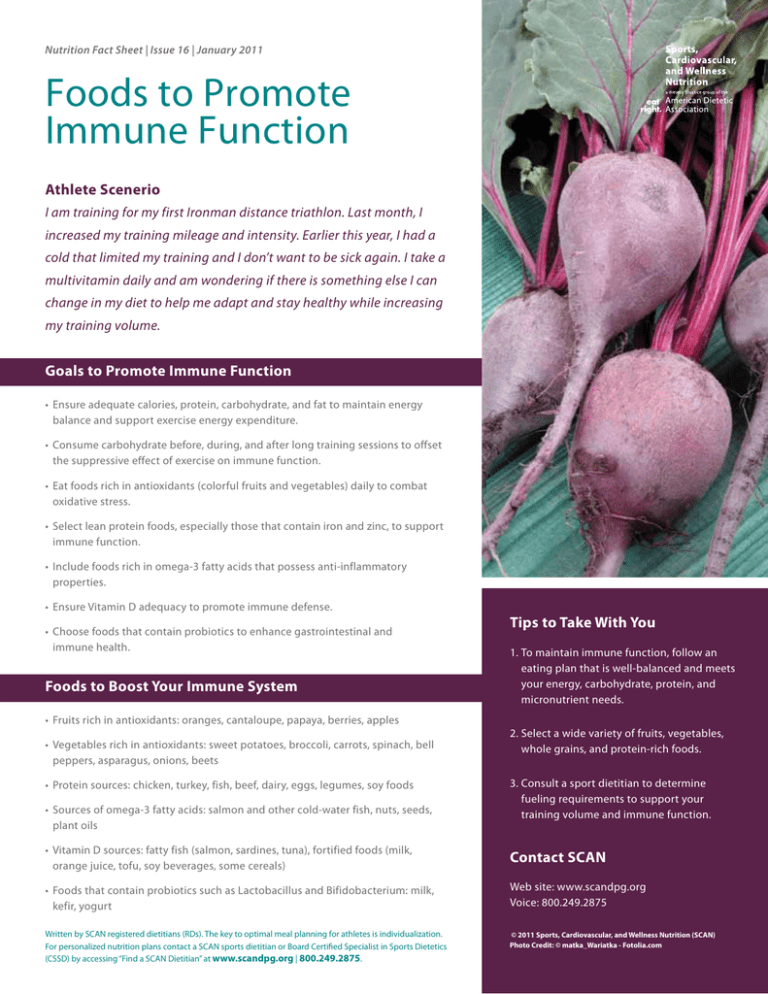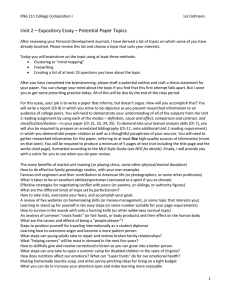Foods to Promote Immune Function Athlete Scenerio
advertisement

Nutrition Fact Sheet | Issue 16 | January 2011 Foods to Promote Immune Function Athlete Scenerio I am training for my first Ironman distance triathlon. Last month, I increased my training mileage and intensity. Earlier this year, I had a cold that limited my training and I don’t want to be sick again. I take a multivitamin daily and am wondering if there is something else I can change in my diet to help me adapt and stay healthy while increasing my training volume. Goals to Promote Immune Function • Ensure adequate calories, protein, carbohydrate, and fat to maintain energy balance and support exercise energy expenditure. • Consume carbohydrate before, during, and after long training sessions to offset the suppressive effect of exercise on immune function. • Eat foods rich in antioxidants (colorful fruits and vegetables) daily to combat oxidative stress. • Select lean protein foods, especially those that contain iron and zinc, to support immune function. • Include foods rich in omega-3 fatty acids that possess anti-inflammatory properties. • Ensure Vitamin D adequacy to promote immune defense. • Choose foods that contain probiotics to enhance gastrointestinal and immune health. Foods to Boost Your Immune System • Fruits rich in antioxidants: oranges, cantaloupe, papaya, berries, apples • Vegetables rich in antioxidants: sweet potatoes, broccoli, carrots, spinach, bell peppers, asparagus, onions, beets • Protein sources: chicken, turkey, fish, beef, dairy, eggs, legumes, soy foods • Sources of omega-3 fatty acids: salmon and other cold-water fish, nuts, seeds, plant oils Tips to Take With You 1.To maintain immune function, follow an eating plan that is well-balanced and meets your energy, carbohydrate, protein, and micronutrient needs. 2.Select a wide variety of fruits, vegetables, whole grains, and protein-rich foods. 3.Consult a sport dietitian to determine fueling requirements to support your training volume and immune function. • Vitamin D sources: fatty fish (salmon, sardines, tuna), fortified foods (milk, orange juice, tofu, soy beverages, some cereals) Contact SCAN • Foods that contain probiotics such as Lactobacillus and Bifidobacterium: milk, kefir, yogurt Web site: www.scandpg.org Voice: 800.249.2875 Written by SCAN registered dietitians (RDs). The key to optimal meal planning for athletes is individualization. For personalized nutrition plans contact a SCAN sports dietitian or Board Certified Specialist in Sports Dietetics (CSSD) by accessing “Find a SCAN Dietitian” at www.scandpg.org | 800.249.2875. © 2011 Sports, Cardiovascular, and Wellness Nutrition (SCAN) Photo Credit: © matka_Wariatka - Fotolia.com




